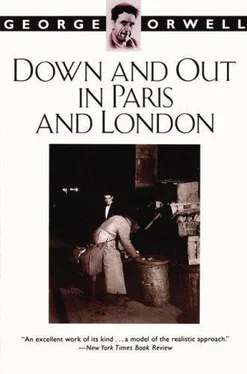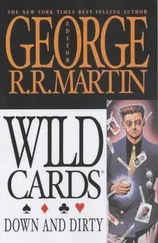George Orwell - Down and Out in Paris and London
Здесь есть возможность читать онлайн «George Orwell - Down and Out in Paris and London» весь текст электронной книги совершенно бесплатно (целиком полную версию без сокращений). В некоторых случаях можно слушать аудио, скачать через торрент в формате fb2 и присутствует краткое содержание. Жанр: Старинная литература, на русском языке. Описание произведения, (предисловие) а так же отзывы посетителей доступны на портале библиотеки ЛибКат.
- Название:Down and Out in Paris and London
- Автор:
- Жанр:
- Год:неизвестен
- ISBN:нет данных
- Рейтинг книги:5 / 5. Голосов: 1
-
Избранное:Добавить в избранное
- Отзывы:
-
Ваша оценка:
- 100
- 1
- 2
- 3
- 4
- 5
Down and Out in Paris and London: краткое содержание, описание и аннотация
Предлагаем к чтению аннотацию, описание, краткое содержание или предисловие (зависит от того, что написал сам автор книги «Down and Out in Paris and London»). Если вы не нашли необходимую информацию о книге — напишите в комментариях, мы постараемся отыскать её.
Down and Out in Paris and London — читать онлайн бесплатно полную книгу (весь текст) целиком
Ниже представлен текст книги, разбитый по страницам. Система сохранения места последней прочитанной страницы, позволяет с удобством читать онлайн бесплатно книгу «Down and Out in Paris and London», без необходимости каждый раз заново искать на чём Вы остановились. Поставьте закладку, и сможете в любой момент перейти на страницу, на которой закончили чтение.
Интервал:
Закладка:
of making money. I have heard
from him since, and he tells me that he is making a
hundred francs a day and has set up a girl who is trés
serieuse and never smells of garlic.
I spent a day wandering about our quarter, saying
good-bye to everyone. It was on this day that Charlie
told me about the death of old Roucolle the miser, who
had once lived in the quarter. Very likely Charlie was
lying as usual, but it was a good story.
Roucolle died, aged seventy-four, a year or two
before I went to Paris, but the people in the quarter still
talked of him while I was there. He never equalled
Daniel Dancer or anyone of that kind, but he was an
interesting character. He went to Les Halles every
morning to pick up damaged vegetables, and ate cat's
meat, and wore newspaper instead of underclothes, and
used the wainscoting of his room for firewood, and
made himself a pair of trousers out of a sack-all this
with half a million francs invested. I should like very
much to have known him.
Like many misers, Roucolle came to a bad end
through putting his money into a wildcat scheme. One
day a Jew appeared in the quarter, an alert, businesslike
young chap who had a first-rate plan for smuggling
cocaine into England. It is easy enough, of course, to buy
cocaine in Paris, and the smuggling would be quite
simple in itself, only there is always some spy who
betrays the plan to the customs or the police. It is said
that this is often done by the very people who sell the
cocaine, because the smuggling trade is in the hands of a
large combine, who do not want competition. The Jew,
however, swore that there was no danger. He knew a way
of getting cocaine direct from Vienna, not through the
usual channels, and there would be no blackmail to pay.
He had got into touch with Roucolle through a young
Pole, a student at the Sorbonne, who
was going to put four thousand francs into the scheme if
Roucolle would put six thousand. For this they could buy
ten pounds of cocaine, which would be worth a small
fortune in England.
The Pole and the Jew had a tremendous struggle to
get the money from between old Roucolle's claws. Six
thousand francs was not much-he had more than that
sewn into the mattress in his room-but it was agony for
him to part with a sou. The Pole and the Jew were at him
for weeks on end, explaining, bullying, coaxing, arguing,
going down on their knees and imploring him to produce
the money. The old man was half frantic between greed
and fear. His bowels yearned at the thought of getting,
perhaps, fifty thousand francs' profit, and yet he could
not bring himself to risk the money. He used to sit in a
corner with his head in his hands, groaning and
sometimes yelling out in agony, and often he would kneel
down (he was very pious) and pray for strength, but still
he couldn't do it. But at last, more from exhaustion than
anything else, he gave in quite suddenly; he slit open the
mattress where his money was concealed and handed
over six thousand francs to the Jew.
The Jew delivered the cocaine the same day, and
promptly vanished. And meanwhile, as was not sur-
prising after the fuss Roucolle had made, the affair had
been noised all over the quarter. The very next morning
the hotel was raided and searched by the police.
Roucolle and the Pole were in agonies. The police were
downstairs, working their way up and searching every
room in turn, and there was the great packet of cocaine
on the table, with no place to hide it and no chance of
escaping down the stairs. The Pole was for throwing the
stuff out of the window, but Roucolle
would not hear of it. Charlie told me that he had been
present at the scene. He said that when they tried to
take the packet from Roucolle he clasped it to his
breast and struggled like a madman, although he was
seventy-four years old. He was wild with fright, but he
would go to prison rather than throw his money away.
At last, when the police were searching only one floor
below, somebody had an idea. A man on Roucolle's floor
had a dozen tins of face-powder which he was selling on
commission; it was suggested that the cocaine could be
put into the tins and passed off as face-powder. The
powder was hastily thrown out of the window and the
cocaine substituted, and the tins were put openly on
Roucolle's table, as though there there were nothing to
conceal. A few minutes later the police came to search
Roucolle's room. They tapped the walls and looked up the
chimney and turned out the drawers and examined the
floorboards, and then, just as they were about to give it
up, having found nothing, the inspector noticed the tins
on the table.
"
Tiens ," he said, "have a look at those tins. I hadn't
noticed them. What's in them, eh?"
"Face-powder," said the Pole as calmly as he could
manage. But at the same instant Roucolle let out a loud
groaning noise, from alarm, and the police became
suspicious immediately. They opened one of the tins and
tipped out the contents, and after smelling it, the
inspector said that he believed it was cocaine. Roucolle
and the Pole began swearing on the names of the saints
that it was only face-powder; but it was no use, the more
they protested the more suspicious the police became.
The two men were arrested and led off to the police
station, followed by half the quarter.
At the station, Roucolle and the Pole were inter
rogated by the Commissaire while a tin of the cocaine
was sent away to be analysed. Charlie said that the
scene Roucolle made was beyond description. He wept,
prayed, made contradictory statements and denounced
the Pole all at once, so loud that he could be heard half
a street away. The policemen almost burst with
laughing at him.
After an hour a policeman came back with the tin of
cocaine and a note from the analyst. He was laughing.
"This is not cocaine, monsieur," he said.
"What, not cocaine?" said the Commissaire. "
Mais,
alors
-what is it, then?"
"It is face-powder."
Roucolle and the Pole were released at once, entirely
exonerated but very angry. The Jew had doublecrossed
them. Afterwards, when the excitement was over, it
turned out that he had played the same trick on two
other people in the quarter.
The Pole was glad enough to escape, even though he
had lost his four thousand francs, but poor old
Roucolle was utterly broken down. He took to his bed at
once, and all that day and half the night they could
hear him thrashing about, mumbling, and sometimes
yelling out at the top of his voice:
"Six thousand francs!
Nom de Jesus-Christ ! Six
thousand francs!"
Three days later he had some kind of stroke, and in
a fortnight he was dead-of a broken heart, Charlie said.
XXIV
I TRAVELLED to England third class via Dunkirk and
Tilbury, which is the cheapest and not the worst way of
crossing the Channel. You had to pay extra for
a cabin, so I slept in the saloon, together with most of
the third-class passengers. I find this entry in my diary
for that day:
"Sleeping in the saloon, twenty-seven men, sixteen
women. Of the women, not a single one has washed her
face this morning. The men mostly went to the bathroom;
the women merely produced vanity cases and covered the
Читать дальшеИнтервал:
Закладка:
Похожие книги на «Down and Out in Paris and London»
Представляем Вашему вниманию похожие книги на «Down and Out in Paris and London» списком для выбора. Мы отобрали схожую по названию и смыслу литературу в надежде предоставить читателям больше вариантов отыскать новые, интересные, ещё непрочитанные произведения.
Обсуждение, отзывы о книге «Down and Out in Paris and London» и просто собственные мнения читателей. Оставьте ваши комментарии, напишите, что Вы думаете о произведении, его смысле или главных героях. Укажите что конкретно понравилось, а что нет, и почему Вы так считаете.












